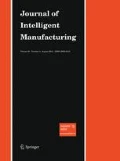Abstract
This paper deals with a scheduling problem in a metal mould assembly process. The process is of job shop type with several additional constraints. One constraint is that precedence relations exist not only among operations but also among jobs. The other constraint is that the system has two types of machines in parallel. The single-function machine executes a specific operation of each job and the multi-function machine can execute several operations. Therefore selection of the machine is necessary for executing each operation. In addition the problem has two objective functions. One is to minimize the sum of the tardiness of each job, and the other is to maximize the working time of the multi-function machine because of reducing the operating cost of machines. An autonomous decentralized scheduling algorithm is proposed to obatin a compromise solution of the multi-objective problem. In this algorithm, a number of decision makers are called subsystems, which co-operate with one another in order to attain the goal of the overall system. In our algorithm, all jobs and the set of multi-function machine are defined as the subsystem because their objective functions are competitive. They determine the scheduling plan on the basis of their co-operation and the satisfaction of their own objective function levels. The effectiveness of the algorithm is investigated by examining numerical results.
Similar content being viewed by others
References
Iima, H., Fukui, A. and Sannomiya, N. (1996) A method for constructing an autonomous decentralized scheduling system in a parallel machine problem. Transactions of the Institute of Systems, Control and Information Engineers, 9, 97–99 (in Japanese).
Iima, H., Kudo, R., Sannomiya, N. and Kobayashi, Y. (1997) An autonomous decentralized scheduling algorithm for a job shop process with a multi-function machine in parallel, in Proceedings of the Third International Symposium on Autonomous Decentralized Systems, Berlin, April 1997, IEEE Computer Society Press, Los Alamitos, California, pp. 69–74.
Ito, M. and Yuasa, H. (1993) Autonomous decentralized system with self-organizing function and its application to generation of locomotive patterns, in Proceedings of the International Symposium on Autonomous Decentralized Systems, Kawasaki, March 1993, IEEE Computer Society Press, Los Alamitos, California, pp. 130–136.
Fukui, A., Iima, H. and Sannomiya, N. (1997) Autonomous decentralized scheduling system for an operation assignment problem. Transactions of the Institute of Systems, Control and Information Engineers, 10, 107–115 (in Japanese).
Ssannomiya, N., Iima, H. and Aoki, A. (1998) The effect of heuristics in genetic algorithm for solving a scheduling problem, in Proceedings of the Ninth Symposium on Information Control in Manufacturing Systems (INCOM '98)Nancy-Metz, June 1998, Elsevier, Oxford.
Author information
Authors and Affiliations
Rights and permissions
About this article
Cite this article
IIMA, H., KUDO, R., SANNOMIYA, N. et al. An autonomous decentralized scheduling algorithm for a scheduling problem in a metal mould assembly process. Journal of Intelligent Manufacturing 10, 161–167 (1999). https://doi.org/10.1023/A:1008924704040
Issue Date:
DOI: https://doi.org/10.1023/A:1008924704040




